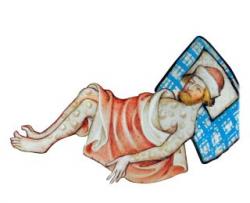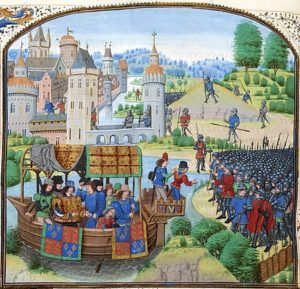
Medieval drawing of a man suffering from The Black Death.
An old saw exists about great art being born of great suffering. It might also be true that great suffering gives birth to great change. The suffering of the plague years in Europe (approximately 1328 to 1351) resulted in the deaths of “up to 200 million people in Europe alone.” (Newman). This unimaginable loss preceded not only the birth of Chaucer and other English literary greats such as The Pearl Poet and the author of Piers Plowman, but also led to a literal revolution in how employment worked.
How you ask does a plague cause a workers’ revolution? From 1351, when England and Europe began to recover from the ravages of The Black Death to 1381, and the days of what is known as The Peasants’ Revolt, a number of circumstances and events combined to produce the months long rebellion also known as Wat Tyler’s Rebellion. Simon Newman’s explanation is as succinct as possible when dealing with complex beliefs and events from a distance of more than 600 years. He states:
The Peasants’ Revolt is directly linked to the employment shortage created by the horrifying mortality rates of Black Death, and had it . . . not been for the plague and for the feeling that the plague was directly linked to the Almighty then the peasants may never have fought for their rights and freedoms.

Richard II meets the rebels on 14 June 1381 in a miniature from a 1470s copy of Jean Froissart’s Chronicles.
To summarize, the effects of the Black Death had a dramatic impact on the society, including:
- Both prices of resources and peasant wages increased.
- Greater value was placed on labour
- Land that had been used for farming was acquired for the purpose of pasturing, which was much less labour intensive
- This dramatic change in the farming processes led to increased production of wool and cloth
- Peasants from villages migrated to towns and cities, leading to the downfall of the Feudal System
- Peasants became disillusioned with the church, and the church’s power to lead and influence was undermined, creating the opportunity for the English reformation
Other sources suggest that royalty, nobility, and the upper classes, i.e. those who made and enforced the nation’s laws and also employed the peasants, responded with very little foresight.
In 1348 a plague known as the Black Death crossed from mainland Europe into England, rapidly killing an estimated 50 per cent of the population. After an initial period of economic shock, England began to adapt to the changed economic situation. The death rate among the peasantry meant that suddenly land was relatively plentiful and manpower in much shorter supply. Labourers could charge more for their work and, in the consequent competition for labour, wages were driven sharply upwards. In turn, the profits of landowners were eroded. The trading, commercial and financial networks in the towns disintegrated.
The authorities responded to the chaos with emergency legislation; the Ordinance of Labourers was passed in 1349, and the Statute of Labourers in 1351. These attempted to fix wages at pre-plague levels, making it a crime to refuse work or to break an existing contract, imposing fines on those who transgressed. The system was initially enforced through special Justices of Labourers and then, from the 1360s onwards, through the normal Justices of the Peace, typically members of the local gentry. Although in theory these laws applied to both labourers seeking higher wages and to employers tempted to outbid their competitors for workers, they were in practice applied only to labourers, and then in a rather arbitrary fashion. The legislation was strengthened in 1361, with the penalties increased to include branding and imprisonment. The royal government had not intervened in this way before, nor allied itself with the local landowners in quite such an obvious or unpopular way.
The English government is representative of many European nations in its response to the labor shortage and subsequent revolt of the peasants to any attempt to restore the previous feudal system. However, despite attempts to restore the pre-plague status quo, history proves that the Bubonic Plague not only decimated the population of Europe, but dealt a death blow to the feudal system.

Recent Comments